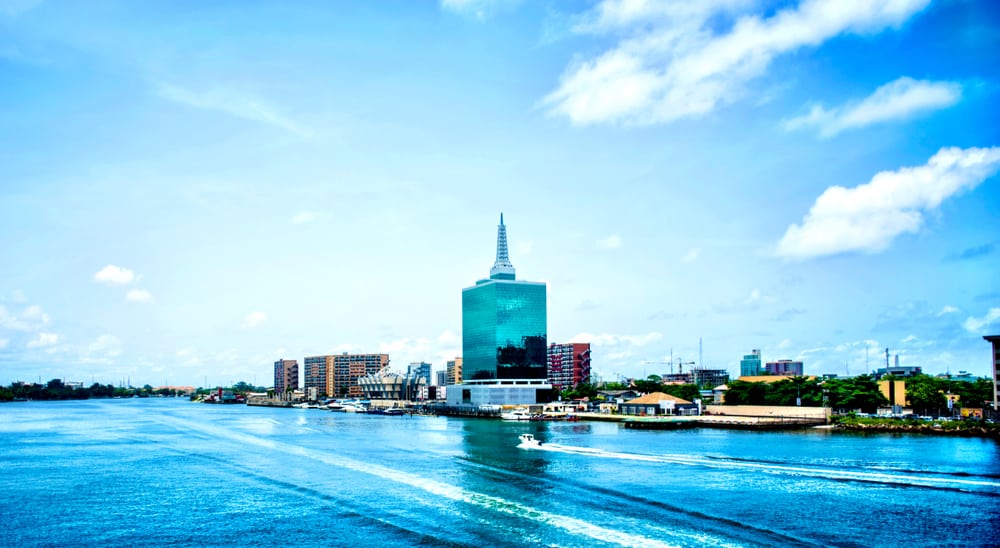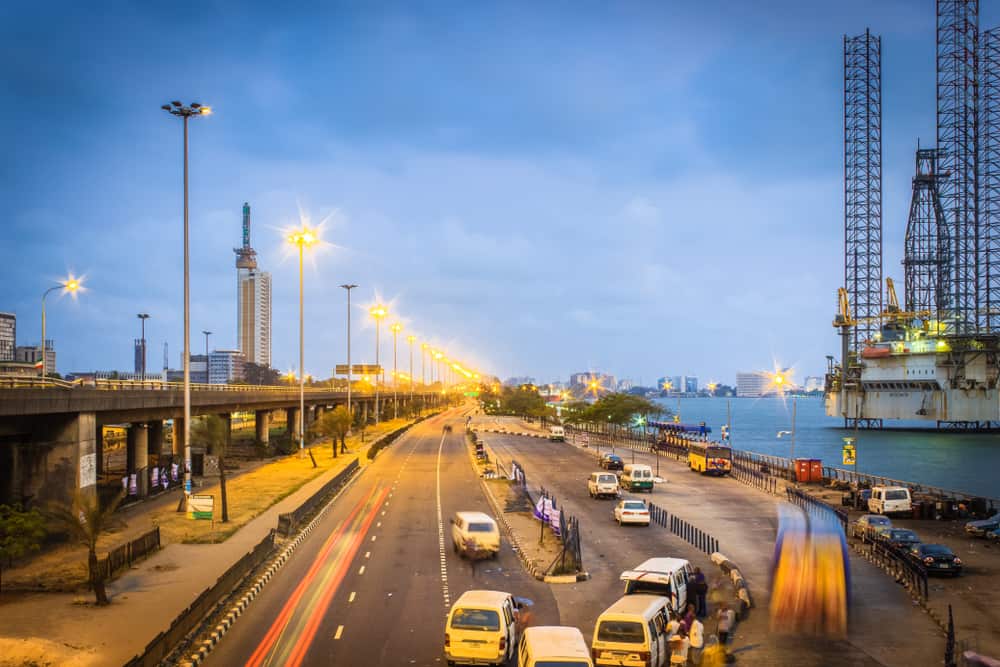
Nigeria is in West Africa. Its coastal region and its most populated city, Lagos, is on the Gulf of Guinea. Nigeria has the largest population on the African continent. Its population is exceptionally diverse with literally hundreds of different languages and dialects being spoken.
Nigeria is rich in natural resources, particularly oil and natural gas. It diverse landscape includes lowlands on the coast and the lower Niger valley, with mountainous regions on its eastern border and high plateaus in the north of the country. Nigeria National Parks protect a wide range of these ‘must visit’ areas.
If you are considering moving to Nigeria, the various costs listed below will help you make an informed decision on what costs are involved when moving and living in this part of Africa.
Quick Nigeria Facts:
- Population: 219,669,923 (2023 estimate)
- Official Language: English is the official language in Nigeria. Besides English, Nigeria has over 520 native languages spoken. The major languages spoken in Nigeria are Hausa, Yoruba, Fula, Igbo, and English creole
- GDP Per Capita: US$2,066 (December 2021)
- Nollywood: Nigeria has a booming movie industry (fondly called ‘Nollywood’) which produces around 10,000 movies per annum.
- Currency: Nigerian Naira (₦). As of 2024, $1 USD = ₦1,657.32, $1 CAD = ₦1,224.70, $1 AUD = ₦1,135.40, €1 = ₦1,828.61, and £1 = ₦2,173.57.
1. Moving and Shipping Costs to Nigeria
The table below shows the estimated cost of hiring a 20- or 40-foot container from a selection of large cities, and shipping it to the five biggest Nigerian cities:
| Origin City | 20FT | 40FT |
|---|---|---|
| Beijing | $3,900 - $4,000 | $6,900 - $7,100 |
| Berlin | $3,200 - $3,300 | $5,800 - $6,000 |
| Chicago | $3,500 - $3,600 | $6,200 - $6,400 |
| Chongqing | $4,000 - $4,100 | $7,100 - $7,300 |
| Delhi | $3,800 - $3,900 | $6,700 - $6,900 |
| Dubai | $2,600 - $2,700 | $4,500 - $4,700 |
| Houston | $3,600 - $3,700 | $6,300 - $6,500 |
| Los Angeles | $3,550 - $3,650 | $6,200 - $6,400 |
| Madrid | $3,300 - $3,400 | $5,900 - $6,100 |
| New York City | $3,400 - $3,500 | $6,100 - $6,300 |
| Paris | $3,250 - $3,350 | $5,900 - $6,100 |
| Phoenix | $3,500 - $3,600 | $6,200 - $6,400 |
| Rome | $3,300 - $3,400 | $5,900 - $6,100 |
| Shanghai | $4,000 - $4,100 | $7,000 - $7,200 |
| Sydney | $4,050 - $4,150 | $7,100 - $7,300 |
| Toronto | $3,550 - $3,650 | $6,200 - $6,400 |
| Vancouver | $3,600 - $3,700 | $6,300 - $6,500 |
| Vienna | $3,250 - $3,350 | $5,900 - $6,100 |
- All figures are in USD;
- The rates above are estimates only and may have changed since the time this article was updated (October 2024). They are based on the lowest estimated rate from sites such as Freightos, Flexport, or Maersk;
- To get a more accurate idea of the cost for you, please use the quote form at the top of this page;
- Please also see our guide to international container shipping.
2. Nigeria Housing Costs

There’s a good selection of upmarket housing for expats in the major cities, including villas, townhouses and apartments. If you intend to live outside the major centres, you’ll find there’s not much choice and the standard of housing reflects the poverty that exists in the country.
Monthly Rental Prices in Nigeria
- 1 bedroom apartment in City Centre: ₦150,000 – ₦1,200,000
- 1 bedroom apartment outside the City Centre: ₦90,000 – ₦500,000
- 3-bedroom apartment in City Centre: ₦436,790 – ₦3,250,000
- 3-bedroom apartment outside the City Centre: ₦225,000 – ₦1,750,000
- Price per square metre (10.7 square feet) to buy in City Centre: ₦125,000 – ₦5,000,000
- Price per square metre (10.7 square feet) to buy outside City: ₦60,000 – ₦2,000,000
Nigeria Housing Cost Comparison
This is how rents in Nigeria compare with other countries around the globe.
United Kingdom is 11% cheaper
United States is 38.3% more expensive
Canada is 1.2% cheaper
Australia is 15.8% more expensive
France is 36% cheaper
Spain is 58.1% more expensive
Italy is 40.2% cheaper
Germany is 24.4% cheaper
Source: Numbeo
How to Save on Housing Costs
- Share an apartment or house. Have a look at the following sites to find your perfect room or flat mate to reduce your accommodation costs: Erasmusu, My Roommate, Loozap and
- Different areas – different prices. Most expats work and live in either Abuja or Lagos. Housing is more difficult to find in Abuja than it is in Lagos. Secure areas popular with expats in Lagos are Ikoyi and Victoria Island. Apapa is a more affordable area and is where you’ll find apartments complexes and the old colonial houses.
3. Nigeria Food, Grocery and Restaurant Costs
Nigeria’s major cities have a great selection of excellent restaurants serving the international community that lives in the country and those who are visiting for business purposes. You’ll find every country represented in the many hotels and restaurants that line the main streets of Abuja and Lagos.
- Inexpensive Restaurant: ₦350 – ₦2,000
- Takeout Coffee: ₦200 – ₦2,500
- Bottle of Coke: ₦150 – ₦250
- 1L of milk: ₦550 – ₦2,500
- Loaf of Bread: ₦300 – ₦1,000
- 12 Eggs: ₦380 – ₦1,250.00
- 1kg Chicken: ₦1,500 – ₦3,800
- 1kg Beef: ₦900 – ₦4,000
- 1kg Apples: ₦500 – ₦2,500
- 1kg White Rice: ₦500 – ₦62
This is how restaurants and food prices compare with other major countries:
- United Kingdom restaurants are 7% more expensive and groceries are 50.4% more expensive than Nigeria.
- United States restaurants are 08% more expensive and groceries are 128.94% more expensive than Nigeria.
- Canadian restaurants are 5% more expensive and groceries are 104.8% more expensive than Nigeria.
- Australian restaurants are 9% more expensive and groceries are 135.7% more expensive than Nigeria.
- French restaurants are 9% more expensive and groceries are 1.4.4% more expensive than Nigeria.
- German restaurants are 7% more expensive and groceries are 69.54% more expensive than Nigeria.
- Italian restaurants are46% more expensive and groceries are 64.3% more expensive than Nigeria.
- Spanish restaurants are1% more expensive and groceries are 30.5% more expensive than Nigeria
Source: Numbeo
Bonus Tips for Cheaper Food, Restaurants and Groceries
- Know your supermarkets: Nigeria has many independently owned grocery stores as well as the usual supermarket chains. There are also excellent farmers’ markets and shops which sell health foods and organic foods. Popular supermarkets in Nigeria are Shoprite (Nigeria’s largest supermarket chain), Justrite, Addide (upmarket store), Market Square and FoodCo.
- Find Cheap Eats:Eating out in Nigeria is cheaper than in many other countries. Have a look at the following sites to see where you can experience great food at really affordable prices: – Trip Advisor, Pulse, Lifestyle by Tooshay and Trip Advisor Abuja.
4. Nigeria Alcohol Costs
Alcohol is available throughout Nigeria except for parts of Kano state where it is banned. Nigerians are extremely sociable and enjoy drinking with friends and family. Both Lagos and Abuja have many upmarket bars and clubs where expats can enjoy an evening out.
- Pint (0.5L) domestic beer at a restaurant/pub: ₦250 – ₦900
- Bottle of imported beer at a restaurant/pub: ₦400 – ₦1,000
- Pint (0.5L) domestic beer at a supermarket: ₦200 – ₦600
- Bottle of imported beer at a supermarket: ₦300 – ₦1,000
- Mid-range bottle of wine at a supermarket: ₦1,000 – ₦5,000
How to drink for less in Nigeria
- Keep an eye online and in local papers and flyers for advertised cheap drinks, either in supermarkets or in bars, clubs and restaurants.
- Many bars and restaurants have specials after work. Check out Eat Drink Lagos, Ofadaa and Road Book where wine, cocktails and beer are often half price.
5. Nigeria Transportation Fares

Public transport in Nigeria is chaotic, unsafe and disorganised which is why expats usually have a car and a driver to get them from A to B.
Here are some example ticket costs.
- Adult Single – ₦350
- One day ticket – ₦1,300
- Monthly season ticket, unlimited – ₦11,500
6. Cost of Internet in Nigeria
Nigeria is one of the cheapest countries in Africa for internet. The most popular ISPs in Nigeria include:
- FiberOne – ₦11, 450 per month for 16Mbps per month
- Smile Communications – ₦12,OOO for 8Mbps
7. Cost of Clothing, Personal Items, Gym and Leisure
Nigeria has three distinct climatic regions. The south experiences tropical monsoons, the centre is tropical savannah, and the north experiences a Sahelian hot and semi-arid climate.
The average monthly temperatures range between 24C (December and January) and 30C for the rest of the year. It can rain at any time of the year but the main rain falls between April and October. Nigeria has an annual rainfall of 1,165mm, with August usually being the wettest month.
Here are some clothing prices, together with other useful prices.
- Pair of Jeans: ₦2,500 – ₦18,000
- Summer Dress: ₦15,000 – ₦24,000
- Running Shoes (Trainers): ₦10,000 – ₦35,000
- Business Shoes: ₦15,000 – ₦45,000
- Short Doctor’s visit (15 mins): ₦12,300
- Deodorant: ₦478
- Shampoo: ₦574
- Toilet Paper (4 rolls): ₦445
- Gym membership: ₦8,000 – ₦27,500 per month
- Movie (cinema) ticket: ₦3,000 – ₦4,000
Source: Numbeo and Expatistan
8. Cost of Owning a Car and Driving a Car in Nigeria

Driving in Nigeria is hectic. Traffic is always congested, and there are few parking spaces which is why expats generally hire drivers to get them from A to B. You can drive on your home country’s licence for 3 months or on an International Driving Licence for 12 months after which you’ll need to get a local licence.
Here are some other sample costs of owning and operating a car in Nigeria:
- Volkswagen Golf:₦23,225,000
- 1 litre (¼ gallon) of gas (petrol):₦256
- Other fees (if any):The average monthly cost of owning running a basic four-seater car in Nigeria is around ₦250,000.
Source: Expatistan
Ways to save money driving in Nigeria
- Car sharing or pooling is one way to save money. Try Car Pool World, Shareride2go, and
- Taxis are an option. Try Uber for cheaper fares or just stick with your car and driver.
Need your car/vehicle moved to Nigeria? Then read our guide to: Car Transport & Vehicle Shipping.
9. Taxes in Nigeria
Personal income tax ranges from 7% to 24% depending on your income (PWC). VAT is only 7.5% and is added to most goods and services. Foreigners are not allowed to own property, but it can be purchased by a Nigerian registered company, even if that company is owned by non-Nigerians.
10. Flight Costs from Nigeria
If you do make the move to Nigeria, here’s approximately how much it will cost to fly to major world cities based on lowest, one-way fares from Skyscanner as of early 2023.
- London: ₦135,778
- New York: ₦202,566
- Toronto: ₦248,520
- Sydney: ₦466,378
- Paris: ₦133,456
- Berlin: ₦138,777
- Rome: ₦142,455
- Madrid: ₦136,428
Other Nigeria Relocation Tips

The costs and pricing above should give you a good idea of the cost of living in Nigeria but perhaps the following extra tips will make your move go smoothly.
11. Relocating to Nigeria Alone
Moving is always a stressful time but moving on your own can be exceptionally difficult. Nigeria is not the easiest country to settle down in but hopefully the following tips will help you to settle a little quicker.
- Meetups:Nigeria has many Meetup groups covering a wide range of activities from yachting to IT. Meetup is a great way to find people who have the same interests as you. Most expats go to Nigeria to work for large organisations which means there will be people within the company that will help you settle in.
- Attend local events: There is always something going on in Nigeria and many of the activities are free. Have a look at the following sites for inspiration – TripAdvisor, Atlas Obscura and The Crazy Tourist.
12. Moving to Nigeria with a Family
Moving to Nigeria with family can be challenging. Your company will give you lots of support and ensure you live in a safe area. There are also excellent international schools in both Lagos and Abuja.
- New parents (or parents to be):Check out Babymigo and Feedspot for advice, courses and ways to meet other parents or parents to be.
- Live in a family friendly area:The company that employs you will organise housing in safe expat areas in whichever city you’re moving to.
- Find things to do with the kids:Nigeria is an interesting country to explore as long as you are safety conscious. Have a look at the following website for inspiration – TripAdvisor, My Burnt Orange and
13. Moving to Nigeria for Work
Moving to a new country for work is one of the most common reasons people choose to move. While it is possible to move without a job, it makes sense to ensure there are jobs in your field before you make the move.
There are many positions available in security, the oil and gas industry, banking, hospitality, insurance, telecommunications, construction, logistics, healthcare, education and retail.
Here are a few things to consider when moving for work:
- Salary: The costs we outlined above should give you a rough idea, how much more you’ll want to be making to make the move worthwhile. You can also check salary ranges on sites such Glassdoor and Payscale.
- How to find work: If you want to have a job lined up before you move to Nigeria, but aren’t sure where to begin, the following sites are good places to start: Indeed, My Job Mag, Jobberman, Hot Nigerian Jobs and You may also want to Google recruiters in your industry, as they can often help land you some initial interviews as well.
14. Moving to Nigeria from Australia
There’s a small Aussie contingent in Nigeria, mostly working in the oil and gas sectors. If you are thinking of moving from Australia to Nigeria, here are a few things to consider.
- Size comparison:Nigeria’s population is almost ten times the size of Australia’s population but Australia is eight times bigger than Nigeria.
- Join expat groups:MeetUp, InterNations and Facebook offer ways of meeting up with other Australians in Nigeria.
15. Moving to Nigeria from Canada
There’s a small number of Canadians living in Nigeria. If you’re considering making the move from Canada here are a few things to consider.
- Size:There are almost two hundred million people less living in Australia than there are in Nigeria even though Australia is almost eight time the size of Nigeria.
- Expat groups:Meeting up with fellow Canadians helps the moving process. Link up through sites such as MeetUp, InterNations and Dribbble .
16. Moving to Nigeria from the United Kingdom
There’s a large group of Brits living and working in Nigeria so if you’re considering joining them, here are a few bonus tips:
- Size: Nigeria’s population is almost four times that of the UK. Plus, Nigeria is almost four times the size of the UK.
- Expat groups:If you want to get together with others from the UK who are enjoying the weather, then go to MeetUp, InterNations and Facebook.
Hopefully, the tips and costs above are helpful. If want to get started pricing out how much it will cost you to move to Nigeria you can start by comparing moving quotes here.